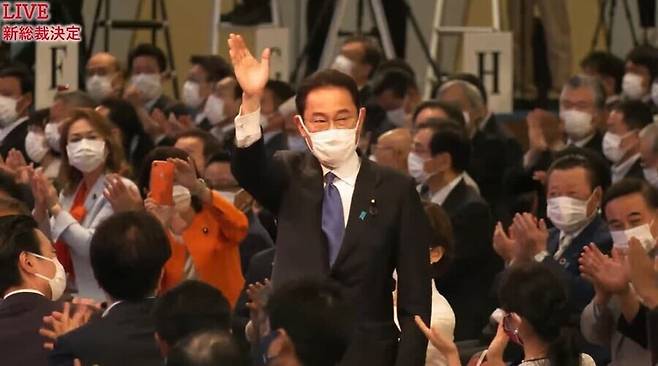Fumio Kishida set to become Japan's 100th prime minister
이 글자크기로 변경됩니다.
(예시) 가장 빠른 뉴스가 있고 다양한 정보, 쌍방향 소통이 숨쉬는 다음뉴스를 만나보세요. 다음뉴스는 국내외 주요이슈와 실시간 속보, 문화생활 및 다양한 분야의 뉴스를 입체적으로 전달하고 있습니다.

Fumio Kishida has been chosen as president of the Liberal Democratic Party (LDP).
At a hotel in Tokyo on Wednesday, Kishida, the 64-year-old former chair of the party's Policy Research Council, won the race to lead the LDP. He stood and bowed to the crowd after being elected.
Picked by the party to become Japan's 100th prime minister, Kishida beat rival Taro Kono, who had overwhelming public support for his calls for administrative reform. The LDP's unique form of factional politics thus won out over public sentiment in Japan demanding political change and reform.
Takeshi Noda, chairman of the party’s election committee, announced voting would start at 1 pm. Kishida earned 257 votes and Kono earned 170, with two abstentions.
After the results were announced, Kishida said that Japan was in a state of national crisis and pledged to tackle COVID-19 with a “desperate determination” and devise economic measures worth trillions of Japanese yen (1 trillion yen is roughly US$9 billion) by year's end.
Regarding the general election in November, he said, "The party's presidential election is over. Let everyone unite wisely and run for both houses of the Diet."
In a press conference after his election, he said, "My specialty is hearing other people's stories. I will listen as much as possible about pending issues and give respectful answers."
In the election's first round, Kishida received 256 votes, Kono received 255, former party Secretary-General Sanae Takaichi received 188, and acting Secretary-General Seiko Noda received 34. No candidate received the 382-vote majority needed to win, so the top two contenders faced off in a second round of voting.
As expected, votes in the first round from the party's mainstream conservatives, including the Hosoda faction, which backed former Prime Minister Shinzo Abe and supported the far-right Takaichi, went to Kishida, demonstrating the division within the LDP.
On diplomatic policy, Kishida said he wants a "free and open Indo-Pacific," but made no specific mention of ties with Korea. The approach of Abe and outgoing Prime Minister Yoshihide Suga toward the Korean Peninsula and public policy is expected to continue, with no major improvements to relations between Seoul and Tokyo on the horizon.
Under the second Abe administration, Kishida served as foreign minister for four years and seven months and jointly announced a bilateral agreement with South Korea on the issue of “comfort women” — a term used to refer to those drafted into sexual slavery by Imperial Japan — on Dec. 28, 2015. During his election campaign, he said, "The ball is in Korea's court."
A high-ranking official at the Blue House said, "The government seeks to cooperate with the newly launched Japanese cabinet to continue future-oriented development between Korea and Japan."
On Monday, Kishida will formally succeed Suga as prime minister at an extraordinary parliamentary session. The LDP is expected to retain its majority in the House of Representatives in the November election, so no major political shifts are anticipated. Kishida's three-year term as party president will end in September 2024.
By Kim So-youn, Tokyo correspondent
Please direct comments or questions to [english@hani.co.kr]
Copyright © 한겨레. 무단전재 및 재배포 금지.
- [속보] ‘고발사주 의혹’ 손준성 검사 관여 확인…공수처 이첩
- 현대중공업 60대 하청노동자 굴착기에 치여 사망
- 모두가 김만배의 형님들…최고 전관 갖춘 대형로펌 수준
- 이준석 “화천대유 ‘50억 클럽’, 곽상도 포함 4명 이름 봤다”
- 카뱅, 고신용자 ‘마통’ 신규 판매 연말까지 중단
- 돌, 바람 그리고 쓰레기…제주 갈 때 ‘환경세’ 내시겠습니까?
- [전국지표조사] 이재명 29%, 윤석열 17%, 홍준표 14%
- 가계대출 금리 3% 돌파…기준금리 인상 영향 시작됐다
- 윤석열 “청약통장 모르면 치매 환자”…이번엔 약자 비하 논란
- ‘로컬 라이프’ 꿈꾼다면, 덜컥 떠나지 마세요